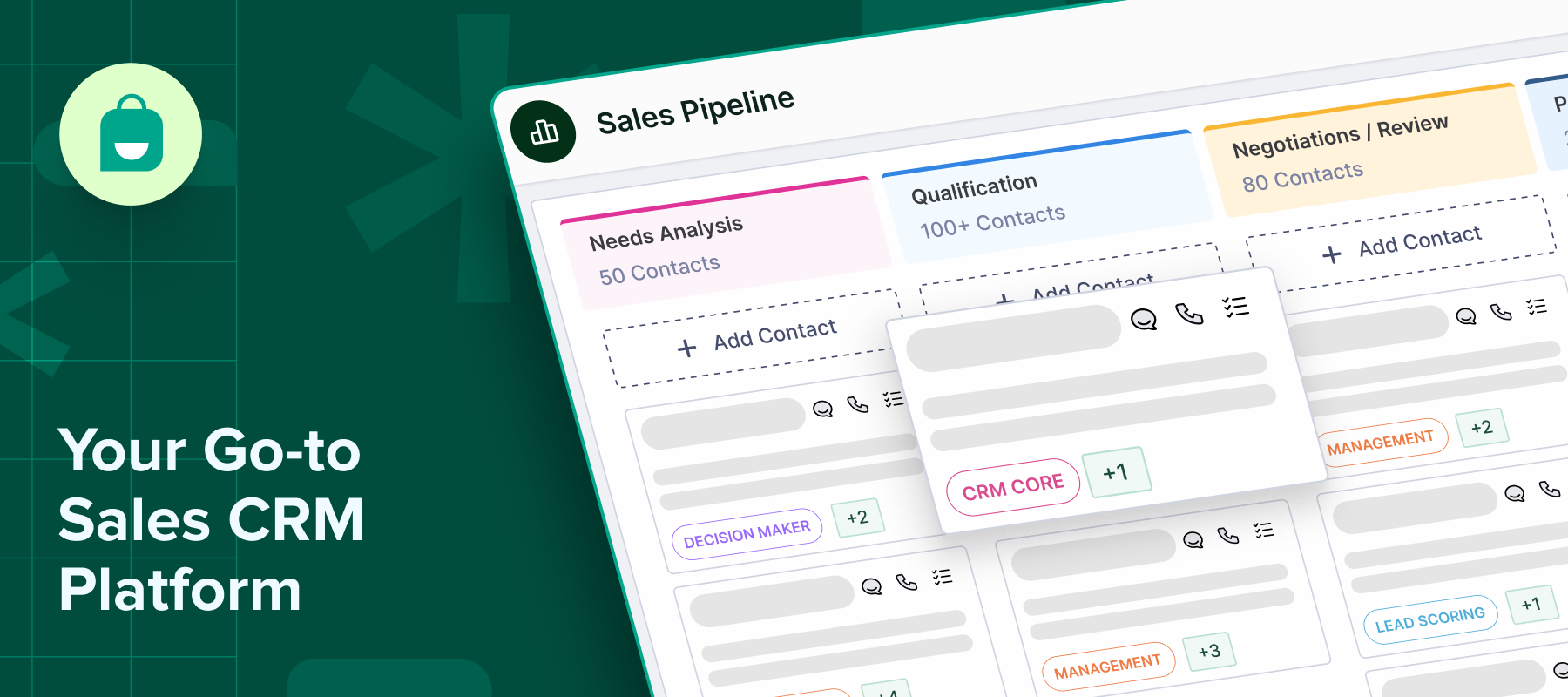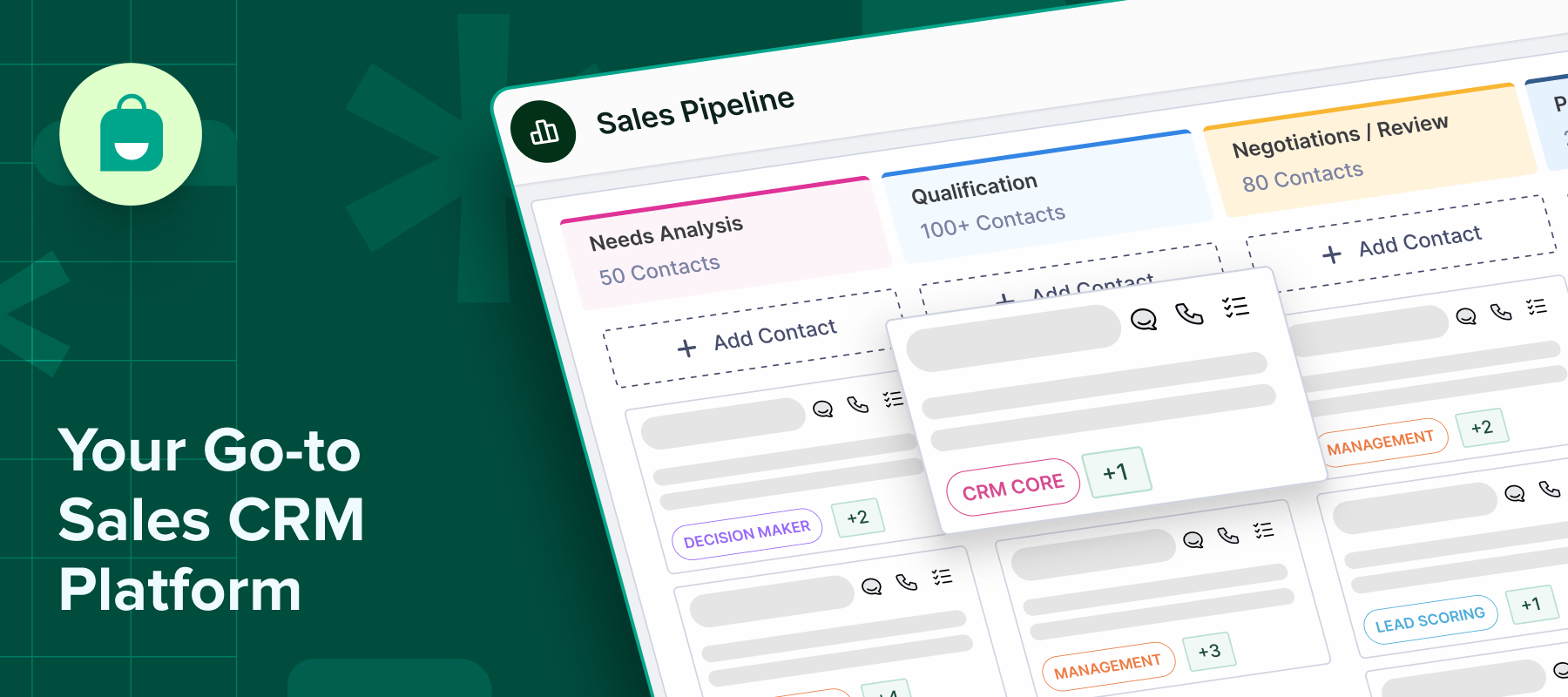In a highly competitive market, missing out on a single lead or follow-up can cost you real revenue, which makes having the right CRM not just helpful, but also essential. Whether you are just starting out or you are a fast-growing business, the right CRM can make all the difference, helping you streamline processes, track opportunities, and close deals faster.
That being said, it is also very important that you know what you need to look for when choosing a CRM for your business. In this post, we will break down the top features that you will need in a sales CRM in 2025 so that you can choose a tool that sets your team up for success.
Must-have features to look for in sales CRM
These are some of the key features you need to prioritize when choosing a CRM that aligns with your sales goals:
1. Contact and lead pipeline management
Efficient contact and lead management are foundational to any good sales CRM. So, look for one that allows your team to easily capture, organize, and segment contacts based on their stage in the buyer journey. From capturing leads through forms to tagging and nurturing them with personalized communication, a good CRM should be able to ensure that you never miss out on any opportunity.
Platforms such as Interakt can be ideal as they can integrate lead capture directly from WhatsApp and other channels, enabling businesses to manage inquiries and turn them into leads without ever needing to switch tabs.
2. Sales pipeline and deal management
You also require a clear, visual sales pipeline that will help you understand where every deal stands, forecast your revenue, and identify bottlenecks in your sales process.
Your CRM should also let you create and customize pipelines that mirror your sales journey well, from prospecting to closure. For instance, Interakt’s seamless and customizable sales pipeline management can let you visualize the progress of each lead in the funnel, allowing you to move deals faster.
3. Automation and workflow management
Automation today is extremely important as it can significantly improve consistency, boost engagement, and improve customer satisfaction, all while saving time and effort for your team. Choose a CRM tool that will let you easily automate follow-ups, assign leads, move deals between stages, and trigger alerts based on specific actions or timelines.
4. Integration with other tools
The best CRM is the one that will fit seamlessly with your existing tech stack or opens potential for future integration with marketing tools, support platforms, eCommerce apps, or messaging services like WhatsApp or email.
Tools like Interakt stand out in this regard, offering deep integrations across platforms like Shopify, WooCommerce, and WhatsApp Business API, for a unified experience.
5. Reporting and analytics
A good CRM tool, as a rule, will have a reliable, real-time analytics dashboard and customizable reporting features. This will enable you to make data-driven decisions through actionable insights into customer behavior, lead sources, sales performance, conversion metrics, etc.
6. Mobile access and usability
It is very likely that your sales team often has to work on the go. See if the CRM offers a mobile app with access to key features like lead management, deal tracking, and communication logs.
While this makes the CRM accessible, you also need to ensure that the mobile app is equally easy to use, responsive, and secure as the original tool. This flexibility becomes especially important for businesses with lean teams that often have to juggle multiple roles and responsibilities.
7. Customization and scalability
No two businesses are the same, and your CRM should be offering the flexibility needed to adapt it to your specific goals and processes. Look for CRMs with customizable fields, reports, pipelines, and workflows.
Scalability is another key factor, so make sure that you pick a CRM that grows with you, offering advanced features and higher user limits as you expand. Platforms such as Interakt are built to support growing businesses, and hence offer scalable pricing tiers and options to expand your automation and integrations over time.
8. Collaboration features
Sales rarely happen unless your team is aligned and is able to work together. Make sure that your CRM tool supports collaboration through team activity feeds, notes, mentions, shared inboxes, and task assignments. Features such as internal chat and shared lead ownership are also critical as they make it easier for marketing, sales, and support to work in sync.
By choosing a CRM solution that enables collaboration, you can ensure better team alignment and by extension better customer experience.
9. Security and compliance
Your CRM is going to hold a lot of sensitive customer information, so strong security protocols are of utmost importance. Check for features like encryption, audit logs, role-based access, and compliance measures for rules and guidelines such as GDPR.
You should also only prioritize tools that are transparent about how they handle and protect data, as this directly impacts your brands credibility and customer trust.
Conclusion
Choosing the right CRM is not just about ticking boxes of features you need. It is about finding a tool that can scale with your business, adapt to new workflows, and support your business through every phase of its growth. Whether you are expanding your sales team, experimenting with newer channels, or automating processes for efficiency, your CRM should grow with you through your business journey.
Looking for a sales CRM built with everything from fast-moving startups to mid-sized to large-sized businesses in mind?


